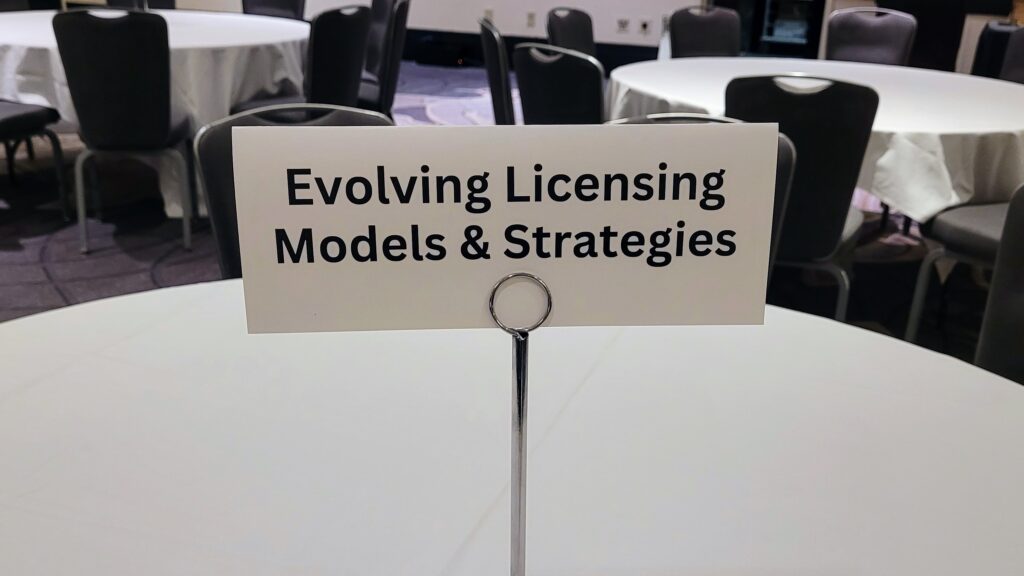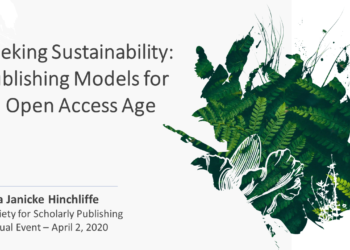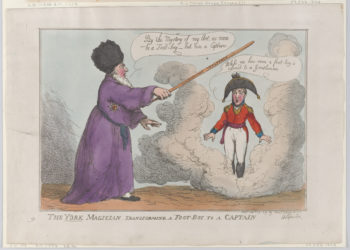During last week’s Coalition for Networked Information (CNI) Fall Meeting I was invited to lead a breakfast roundtable discussion centered on the theme of Evolving Licensing Models and Strategies. Librarians find themselves grappling with numerous challenges in content licensing and are actively working to address these issues by identifying proactive solutions, forging partnerships with the publishing industry, and sharing promising practices to advance their libraries and institutions.
CNI meetings are well-known for showcasing innovative yet pragmatic approaches, offering a platform for fostering forward-looking perspectives on the intersections of libraries and information technology. This discussion was no exception. In this essay, I provide an overview of the contemporary licensing issues discussed in the session, followed by an exploration of the principles and strategies employed by librarians to address these challenges. The post concludes with a summary of the tools and resources highlighted during the discussion as useful in this work.

Contemporary Challenges
Unsurprisingly, the impact of the OSTP Nelson Memo is prominent in library strategies for evolving their licensing strategies. Librarians are both excited to support faculty in open access publishing and also very aware that the breadth of the Memo’s mandates means that many faculty, who have previously been unaffected by the federal public access program as it developed under the OSTP Holdren Memo, will now be facing new and complicated zero-embargo public access demands. Faculty in the humanities and education are particular populations of concern; however, it is anticipated that some potential worries will be abated by the OSTP not requiring any CC license, only reading public access.
Notwithstanding these many facets, the OSTP Nelson Memo is not the only driver for libraries in evolving their licensing approaches. First, the financial situation for libraries is challenging. Budget cuts continue to plague many libraries and, for those with flat budgets, inflation impacts their purchasing power. For libraries in the fortunate position to receive budget increases, these increases may be eaten up by inflation.
Campus and, in the case of public institutions, state procurement policies and procedures are also challenging libraries’ ability to move nimbly. This is particularly an issue in contracting for publishing services because these contracts typically require more levels of review as they are not routine renewals of past contracts. For academy-based publishers (e.g., university presses), contracting challenges can emerge from both sides having procurement frameworks that must be satisfied. An example here included one university asking another to amend its user agreement for a freely-provided online resource. The second university declined, presumably because there is little interest in expending additional legal resources on an alternative agreement for a product that generates no revenue.
Librarians are also aware of the need to manage upwards and outwards in their institutions. First, not all institutions are particularly interested in open access publishing and may not feel much pressure from the OSTP Nelson Memo. In such situations, it is difficult to get any traction for any models evolving licensing in that direction. But, for those institutions that are engaging with open access publishing, article processing charges (APCs), Transformative Agreements, and Pure Publish Agreements are relatively easy to explain to campus administrators and financial officers. The institution receives a specific service in exchange for a payment. Subscribe-to-Open participation seems to continue to fly under the radar as the contract is still for a subscription and essentially a renewal. Programs like the PLOS Community Action Publishing or membership in the Open Book Collective are more difficult to explain, particularly from the frame of the specific benefit to this specific institution, which campus budget presentations can demand.
Likewise, there is sensitivity to faculty perceptions that librarians are trying to determine where faculty publish by facilitating publishing with some publishers and not others. This is complicated because it is admittedly sometimes actually the case that librarians are seeking to disrupt relationships with certain publishers as part of a negotiation strategy or to discourage engagement with predatory publishers as well as to encourage researchers to choose scholar-led venues that are assessed to align with library and/or institutional values. Sometimes, however, it is just that contracts are not yet in place or, frustratingly, unavailable from the publisher in question. Managing faculty expectations and perceptions can require a nuanced approach to communications and outreach.
Finally, librarians are reflecting deeply on the ethics of their licensing models and strategies. Access is an important value in librarianship. But, it is not the only value. Ensuring accessibility for people with disabilities, reader privacy, equity in access to resources and services, bibliodiversity, and long-term preservation are just some of the additional values and priority lenses that librarians are bringing to their licensing work. The ethics of the impact of transformative agreements on local faculty publishing choices and equity in the scholarly ecosystem overall were particularly prominent in the discussion.
Principles and Strategies
As the title of the roundtable discussion reflected, given these many challenges, librarians are proactively seeking to evolve their licensing strategies. Hearteningly, they are being met with creative and responsive proposals from the preponderance of the publishing community, many of whom are also responding to similar pressures and ethical concerns.
The evolving strategies identified in the discussion primarily reflect a focus on enabling open access publishing for campus authors with ancillary attention to other values and priorities. In particular, libraries seem to be pursuing a three-fold approach.
1. Accelerating Engagement with Transformative and Pure Publish Agreements. These agreements enable at-scale open access publishing and support for institutional compliance with funder mandates. Forward-looking librarians are seeking to secure publishing services now so that, as their campus researchers come under the mandates of the OSTP Nelson Memo, the infrastructures will be already established and operational to minimize complexity for those researchers. One librarian reported that with the contracts they have been able to put in place, approximately 80% of their institution’s research impacted by the OSTP Nelson Memo will be compliant when the memo comes into force.
Libraries are seeking to “keep it simple” for their faculty and encourage publishers to continue to improve their workflows to make open access publishing as seamless as possible for authors and also decrease the complexity for libraries administering these agreements. Librarians are pleased to be offered cost-neutral transformative agreements from legacy subscription publishers, which are not only enabling open access publishing but also, in many cases, expanding the reading access for their campuses to closed content.
Likewise, Pure Publish agreements are on the rise, as was seen in the vendor showcase at the Charleston Library Conference. These agreements are allowing libraries to assist their institutions with better financial management and controls over publishing spend.
2. Balancing Contract-Based Publishing Support with an APC Fund. Though the at-scale contracting for open access publishing is a strong strategy for accelerating open access publishing and furthering institutional compliance with funder mandates, not all faculty publish in journals covered by these agreements. In particular, libraries are unlikely to strike publishing contracts with small, independent publishers because those publishers are unlikely to offer such contracts. Librarians, however, do not want to discourage faculty from publishing in these journals and worry that the unintended consequence of transformative and pure publish agreements will be such a shift, particularly given evidence of the impact of these agreements elsewhere.
As such, a number of libraries are establishing, re-establishing, or expanding a fund from which to pay individual APCs. Though concerns remain about sustainability, an APC fund is an equity strategy to ensure that the library supports all faculty in pursuing open access and not just those placing their work with the largest publishers that offer transformative and pure publish agreements or who have their own grant funding. Administering an APC fund also has a secondary benefit for the institution being able to better track its publishing spend.
3. Investing in the Scholarly Communications Ecosystem. Librarians are keenly aware of the larger landscape of the scholarly communications ecosystem and eager to preserve biodiversity as well as foster experimentation and innovation in disseminating scholarship and strengthening intellectual communities. Participation in programs such as the LYRASIS Open Access Community Investment Program, membership in the Open Library of Humanities, and provision of library-based publishing programs are examples of the approaches librarians are taking in this arena. It can be a struggle to budget for these kinds of initiatives and to articulate their value to campus administrators; however, librarians can sometimes find kindred spirits and entrepreneurs among the campus faculty who serve as co-champions for these efforts.
Frameworks and Other Resources
Throughout the discussion, participants also recommended various frameworks and resources that they have found useful in their work:
- Library Partnership Rating for assessing a journal publisher’s alignment with library values.
- The Vendor Contract and Privacy Rubric from the Licensing Privacy Project for evaluating a publisher contract and privacy policy for alignment with library values of privacy, confidentiality, and respect for user control over their own data. (Disclosure – I am the PI for this project.)
- Testing reports from the Library Accessibility Alliance for attending to access for people with disabilities and resources to use in negotiations.
- The Ethical Financial Stewardship Framework as an example of a local model for assessing the corporate practices for alignment with institutional values.
- The Values Drive License Agreement as an example of an approach to mapping license and business terminology to library values.
- FLVC’s pilot project using LegalSifter as an example of using AI tools to evaluate contracts during negotiations.
- unsub for modeling the value of a library’s subscriptions.
- OA Switchboard for monitoring and managing publishing agreements.
Note: The discussion was held under the “Chatham House rule.” As such, this post is a synthesis of the dialogue and does not publicly reveal the identity of the participants or who made which specific comments.
Discussion
2 Thoughts on "Library Licensing Strategies"
Wonderful post Lisa! A truly comprehensive summary of the current library licensing landscape. I especially appreciate all the embedded links for easy follow-up. I’m sharing this widely with my staff and colleagues. Thank you!!
This is a great, spot on summary of the OA challenges, thanks Lisa! Especially the importance of having an OA strategy that covers those three strands you mention (gold, hybrid and green OA through agreements, APC fund and repository) is exactly what we’re working with institutions to implement, in a way unburdening their faculty and admin teams. Adding to the list of resources, I’d recommend Zenodo as a repository for those institutions that do not have the resources to manage an internal one, and also some free OA resources here: https://chronoshub.io/services/researchers/



